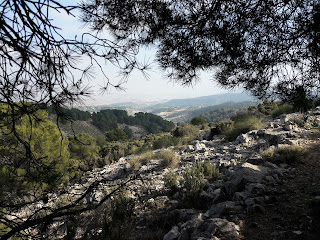Yes, we’re still here, in the mountains, gradually being assimilated into El Berro life - for the meantime anyway. This place captured our imagination as soon as we arrived and continues to enthrall us; its beauty, the clean air, the peacefulness (when the Spanish aren’t celebrating something), and the ‘Je ne sais quoi’ of it. There isn’t a single incomer we’ve met who hasn’t mentioned the El Berro magic.
The longer you spend in a place the more you learn about it (sorry -obvious statement 😏). Every community is a fluid thing, evolving through phases of growth and decline, birth, death, rebirth, and oblivion. High up in these valleys and mountainsides there are many crumbling remains of homesteads and hamlets. The land still holds the terraces created for fruit and olive groves, trees still surviving though the people have gone. The tracks we hike and bike along are often the original trails of those people whose presence is simply a ghostly reminder, traces in the land they worked on and which once sustained them. High up in this Sierra Espûna are the remains of ice houses, stone dome-covered storage pits where the snow was collected, compacted into ice which was then cut and transported many kilometres down through the rocky terrain to the communities lower down. Now, though, there is no snow. Three years ago there was a very unusual snow flurry that came and went like a leaf on a breeze. The moment is remembered with a photo on the wall in the bar.
We have learned that when a small church, and then a church school, were established here in El Berro, drawing the people from remoter places, gradually those people started moving down and making their homes here instead. The village grew where life was easier and the mountain hamlets perished.
 |
| El Berro |
At night, looking out from the ‘mirador’ (viewpoint) where a large statue of Jesus looks out beneficently over the community, the wide coastal plain down below glistens, glows and sparkles with its vast swathe of human population and development. People have trickled down from these mountains and are continuing to do so. The life of El Berro is now suffering the same fate as those mountain hamlets as the river of younger people has flowed down to where there is employment. It’s hard work trying to make a living from a few fruit and olive groves, and insufficiently lucrative to maintain a home and a family in modern times. The little school here which once bubbled with the energy of thirty or more children, now has just three pupils and will close this year.
Apparently the campsite was originally created for the townspeople of Alhama De Murcia, the town further down, allowing them to retreat from the hotter lower region in the summer. It became a draw for other holiday makers and has had various heydays according to which activity is in vogue. Gareth is enjoying his new mountain bike and the company of other bikers who have been coming here every winter for years, but they tell us that fewer bikers now come here than in previous years and fewer campers too.
That is a problem, as the village seems to be almost wholly reliant on tourism. There are new residents; we’ve met a few British people who found the place, like we did, and enjoyed it so much that they bought property, living here for much of the year. But they are older people, not doing much to change the demographic of the community. Nevertheless, I am impressed by the ethics of these and the regular campsite over-winterers, in supporting the village community wherever they can. They are sensitive to the potential for villagers to resent the self-sufficiency of caravaners and motorhomers being careful to support the local bakeries, grocery, the campsite bar and the restaurants. We note, too, how the restaurants support each other by alternating closure days. There are also examples of winter residents doing voluntary work here, like teaching English or assisting with land work. It all adds to the magic of El Berro.

The fate of communities like this bring to mind the observation that as the world’s population grows there are and will be more and more mega-cities, drawing in people from the outer regions like magnets. From one perspective it is possible to see cities as organisms; arteries of roads, veins of sewers, a nervous system of communication services, organs of government, an immune system of health and emergency services, and so on. There is a theory that city dwelling is more efficient, more sustainable and that the death of rural communities is inevitable. Hey, ho. I have occasionally wondered whether the fate of The UK, apart from our own mega-city, London, is to be a theme park for tourists from other parts of the world. Something to think about, post-Brexit, eh?




Having a philosophical impact on you N1 sweetheart. About time too.
ReplyDeleteUnc xx